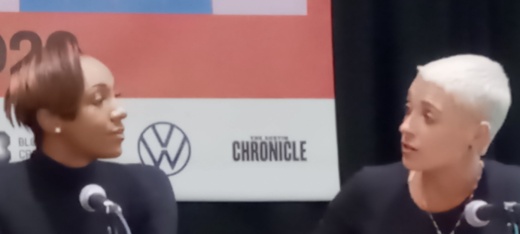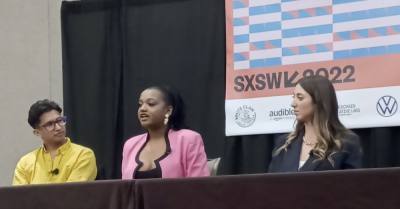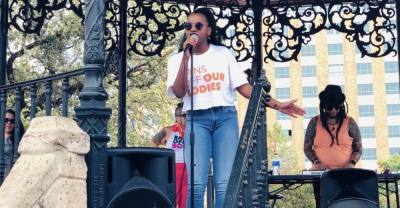Four San Antonians, from government and nonprofit leaders to social media influencers, took part in this year’s South by Southwest Interactive conference in Austin, discussing the various ways they are making an impact in their respective community, workplace or industry.
Sports affecting society
Kara Allen, Spurs sports and entertainment chief impact officer, led a March 13 panel discussion about how professional athletes and franchises are affecting social change.
According to Allen, athletes and their ability to use their public platform and influence societal progress or a movement has been commonplace for decades and something that has become more visible in recent years due to the internet and social media.
“These things have always gone together, but the stories are changing [with the times],” Allen said.
NBC Sports host and panelist Maria Taylor said with an increasing number of women and people of color in positions of power, regardless of organization, such individuals should feel empowered to make a positive change within their organization and then their community. This includes sports franchises and leagues such as the WNBA, Taylor said.
“You have to put people into positions where they are inclined and able to make a ripple,” Taylor said.
Taylor acknowledged some athletes are challenged to use their voice and address some issues, such as the Black Lives Matter and police reform movements, because some fans and pundits would rather the athletes simply stay quiet on social concerns and focus on their jobs.
“You can’t expect anyone to not be themselves. [Athletes] can’t just turn it all off once they step inside the lines,” Taylor said.
Panelist and former WNBA player Renee Montgomery recalled retiring from playing basketball after sitting out the 2020 WNBA season to concentrate on social justice reform. Montgomery then became co-owner and vice president of the Atlanta Dream WNBA franchise.
According to Montgomery, some people lack perspective about athletes, especially athletes of color and how they may face some form of prejudice.
“People can’t understand that we can be fatigued just because we’re Black,” Montgomery said.
The panelists said sports teams and leagues, including their owners and executives, could work with media and fans to be positive agents of social change so long as those organizations listen to the needs of their respective local community.
“Sometimes, teams think they know their communities well when, really, our communities know what they need. It’s up to us, as stewards, to listen,” Allen said.
Young nonprofit leaders
Kimiya Factory, president and executive director of local nonprofit Black Freedom Factory, took part in a March 13 panel about the next generation of nonprofit leaders.
Factory at age 23 is a co-founder and leader of the #ChangeRapeCulture movement that challenges Title IX policies related to structural violence and sexual misconduct at private and public institutions across San Antonio.
Based in east San Antonio, Black Freedom Factory promotes racial equity and social justice through data-driven advocacy, mentorships for grassroots organizers, community outreach, anti-racism training and consulting, according to the group’s mission statement.
Factory said “anti-Blackness” and longstanding social stigmas and prejudices hurt people of color and their struggle to become leaders and advance positive change within their organizations.
Factory said all anyone can do is to realize their self-worth, do critical work within their community, and be credible and consistent with their work.
“What I do to combat [discrimination] is to exist everyday,” she said. “We have to learn to carve spaces for ourselves because we are human.”
Factory said Generation Z and millennial community leaders are vital toward recognizing and fighting social barriers such as rape culture and racism as long as they work in tandem with their constituents and amplify the voices of especially vulnerable and marginalized community members.
“I will always work for the people, side by side,” she said.
Putting open data to work at scale
Brian Dillard, city of San Antonio chief innovation officer, participated in a March 14 workshop about how best to access the value of public data even when faced with an overwhelming amount of data.
Workshop organizers said open data could be great if it were easier to tackle large, overarching questions and issues in order to benefit businesses, nonprofits, institutions and even society as a whole.
According to workshop organizers, Data.gov has more than 26,000 datasets regarding climate change, but the challenge is to determine which sets matter and which ones can drive a data-driven discussion.
Dillard said ensuring data is clean, secure, correct and uncorrupted remains a challenge.
“The last thing I want to do is tell someone, ‘Here’s all the information,’ and it’s wrong,” Dillard said.
Workshop leader Chelsea Collier, founder of the forum Digi.City, said it is unavoidable that data will be found to be contaminated at times.
“I like to think of data as reality in the purest sense, and we bring into it our biases and viewpoints,” Collier said. “[Data] needs to be moderated for the public good, and it’s not easy to do.”
Dillard acknowledged individuals, companies, organizations and communities tend to not trust some data, especially if the data source is considered untrustworthy or adversarial.
Dillard said, in this case, it is critical for organizations, businesses and governments to cultivate positive, open relationships with their constituents to ensure that the data they exchange is clean, correct and relevant.
“We will get better at this the more we do it,” he said.
Twitter ‘Spaces’
Melanie Mendez-Gonzales, founder of the blog "Que Means What," took part in a panel at Twitter House at SXSW about Twitter Spaces, a new audio conversation platform being rolled out by Twitter.
Mendez-Gonzales addressed Latina leadership representation in various organizations and communities. She also spoke about the San Antonio Hispanic Chamber of Commerce’s Latina Leadership Institute, which she is co-chairing this year.
"Everything that affects a woman affects everyone around us. The conversation we're having as women and Latinas is asking, ‘Where are we at the decision-making spaces?’” Mendez-Gonzales said.
According to Mendez-Gonzales, Twitter Spaces could provide all types of people with a vehicle by which to hold unfiltered, intimate conversations. She said she learned a lot from fellow panelists about advocating for families and for the trans community.
“What I learned is that Twitter continues to be a platform to advocate for awareness and change in our communities. And, their social audio feature, Spaces, is another benefit to connect more people in community,” Mendez-Gonzales said.








